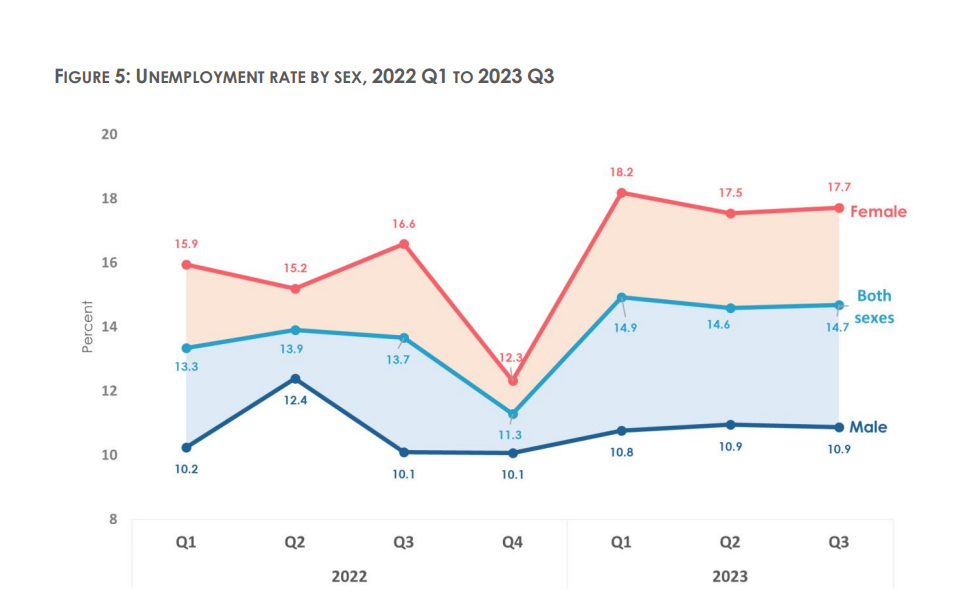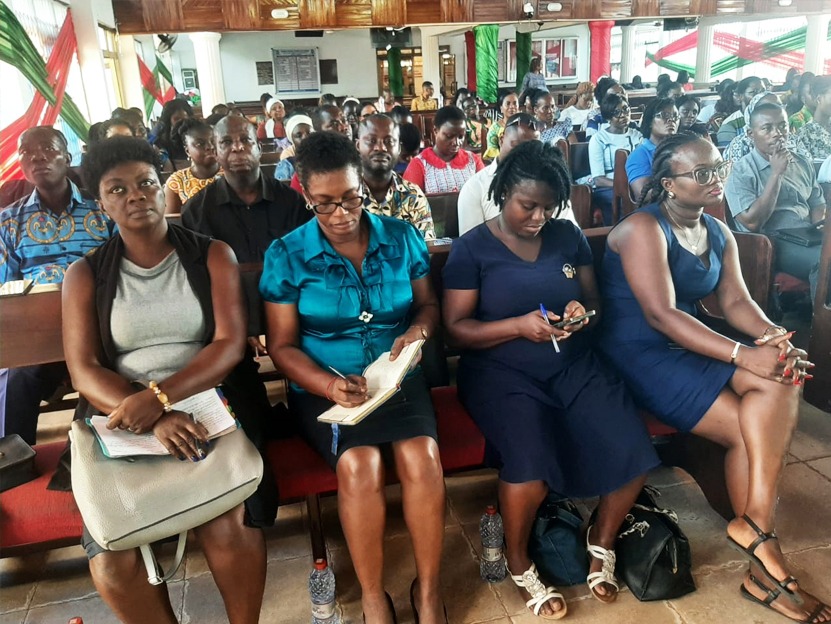
Nestled within the captivating landscapes of Ghana is a harrowing narrative that deeply resonates with countless young individuals— the hustle to survive unemployment.
As freshly graduated students step out of the corridors of academia, they are rudely confronted by the stark realities of the competitive job market. The transition from the realm of hopeful aspirations to the demanding realm of job hunting becomes a transformative experience for many a Ghanaian youth.
The daunting task of searching for employment is a journey that demands an extraordinary display of resilience, creativity, and adaptability, as one navigates the intricate web of obstacles and uncertainties.
However, in the chaos of unemployment, a shimmer of hope sparkles—monetizing one's hobbies and flipping passions into cash. This revolutionary concept challenges the notion that hobbies are solely meant for leisure and encourages the creation of a sustainable business model around one's passions.
It signals individuals to recognize the untapped potential of their passions, inviting them to view their hobbies not just as moments of relaxation, but as lucrative opportunities to generate income.
The revolutionary concept encourages individuals to delve deeper into their passions and uncover the inherent value and marketability that lies within. What was once considered a mere pastime can now be seen as a potential cash cow—a remarkable source of revenue and a gateway to carving out one's own entrepreneurial journey.
In this episode, I share with you the story of four university graduates who confronted the daunting challenge of being jobless. They did not only manage to overcome this adversity, but also transformed their passions into profitable ventures, becoming successful eventually.
I start with Kwame Anthony, who bagged a degree in Statistics from the nation's premiere university-University of Ghana. After a thorough search for employment proved futile, Kwame decided to turn his hobby of writing into a profession. He found peace and purpose in putting his thoughts on paper, and later transferred these thoughts onto his blog, which had been inactive for some time. Initially a personal sanctuary, the blog morphed into a stage where he shared insights on life, love, and politics. Kwame's hobby of writing, having been 'professionalised', started paying the rent through ads and sponsored content.
There's also Ama Simpson, the songbird from Kumasi, who turned her melodic singing hobby into a commercial project. She would record herself singing and post the videos on her social media pages.
After a while, this practice online did not only get her a big following, but also landed her gigs for performances, from clubs to parties to ceremonies, where she charged ‘little' fees. Over time, Ama's singing shifted from a personal passion to a gig, proving that singing can be more than just a soul therapy—it's a paycheck too.
The third person to talk about is Kwesi, a graduate from UCC. Kwesi had passion for graphic design and arts. With his innovative approach to design, he skillfully combined traditional Ghanaian influences with a contemporary edge, captivating attention on a global scale.
His one-of-a-kind creations became the epitome of trendiness, demonstrating that graphic design, deeply rooted in cultural heritage, had the potential to transcend geographical boundaries and establish itself as a thriving global enterprise. Initially a mere side project, Kwesi's venture has gradually evolved into a flourishing international business, propelled by his artistic prowess and the growing demand for his distinctive aesthetic.
The last person I'd talk about is Rosemary, a tech whiz, who dived into freelance projects to ride out the unemployment wave. Her coding skill didn't just open doors but showed how tech skills can make one the digital version of a superhero. Rosemary's story is like a big neon sign saying, “Tech skills can pay the bills, folks!”
I know the unemployment reality experienced by Kwame Tony, Ama Simpson, Kwesi, and Rosemary strikes a chord with numerous young Ghanaians who find themselves in similar circumstances. I must admit that while the idea of converting hobbies into viable cash flow ventures is enticing, the process of transforming a hobby into a profitable venture can indeed be daunting. Among the many challenges is the question of “where to start from”, which I seek to address in this piece.
Start from introspection. This first step entails taking a closer look at one's passions, skills, and areas of expertise. Reflecting on what truly inspires and excites an individual can help them identify the hobbies that have the most potential for monetization. Indeed, one may have many hobbies but not all of them may be ‘monetizable'. This self-awareness lays the foundation for building a business around that one particular hobby which has an inherent commercial appeal.
Once the hobby with the most potential is identified, research becomes the next crucial step. Understanding the market landscape, target audience, and existing competition is essential. This involves conducting market research, studying consumer trends, and identifying gaps or niches that can be filled with unique offering. By gathering valuable insights, individuals can position themselves strategically and tailor their products or services to meet market demands.
As the vision takes shape, it is crucial to consider the practical aspects of setting up and running a business. This includes registering the venture, obtaining necessary licenses or permits, and setting up financial systems to track income and expenses. Seeking guidance from business advisors, mentors, or joining entrepreneurial networks can provide valuable insights and support during this stage.
Building a strong brand presence, either online or physically or both, is another critical aspect of starting a cash flow venture. Online presence has become a big deal now, it is like setting up a market stall but on the internet. Social media, blogs, or your own website—it's where you show off your goods and charm potential clients or customers. Creating a compelling brand identity, including a memorable name, logo, and visual elements, helps establish a distinct and recognizable image in the market. Crafting a compelling brand story and effectively communicating the unique value proposition enables individuals to connect with their target audience on a deeper level.
Marketing and promotion play a pivotal role in driving awareness and attracting people to patronize you. Utilizing various channels such as social media, websites, and networking events can help individuals reach their target audience effectively. Implementing targeted marketing strategies, including content creation, influencer collaborations, and engaging storytelling, can create a buzz around their offerings and generate interest.
Another strategic plan is networking. It involves actively engaging with fellow enthusiasts or professionals in your industry and actively participating in events, both in-person and online. By doing so, you create opportunities to connect with potential clients, partners, or customers.
The essence of networking lies in spreading the word about your skills, expertise, and offerings. Just like handing out flyers, networking allows you to share your message and establish valuable connections that can lead to fruitful collaborations, business opportunities, and a broader reach for your work or services. It's an active and dynamic process that involves building relationships, fostering mutual support, and leveraging the power of connections to expand your professional network and enhance your career prospects.
And hey, diversify your hustle! In the ever-evolving landscape of survival, it's essential to diversify your hustle and explore various avenues of generating income. The market appreciates individuals who adapt and innovate, constantly bringing fresh ideas and solutions to the table. By diversifying your hustle, you demonstrate versatility and agility, which can attract a broader customer base and increase your chances of success.
Additionally, considering collaborations with already established brands can open up exciting opportunities for mutually beneficial partnerships. Collaborating with brands can amplify your reach and credibility. Partnering with well-established or complementary brands can create synergies, allowing you to tap into their existing customer base while also introducing your products or services to a new audience. These collaborations can provide valuable exposure, enhance brand recognition, and potentially lead to increased sales and growth.
To the university graduates and youth hustling through unemployment in Ghana, here's a bit of pep talk. Your journey isn't just about dodging obstacles; it's about the resilience you flex while doing it. While you wait for your dream job, dive into your passions, see the money-making potentials within your hobbies, and treat this waiting-period like a boot camp for self-discovery and skill upgrades. Monetizing your hobbies isn't just survival—it's paving a financially rewarding path that syncs with your passion.
Writer: Daniel Fenyi
Employment Advocate.
Email: [email protected]
The post Strategies to ‘monetize’ your hobby to survive unemployment first appeared on 3News - First In News | Ghana News Updates.
Read Full Story

















Facebook
Twitter
Pinterest
Instagram
Google+
YouTube
LinkedIn
RSS